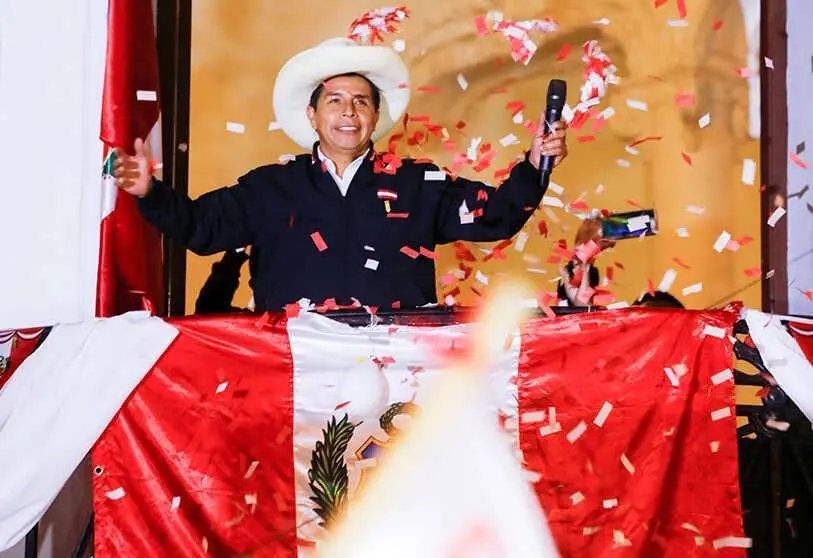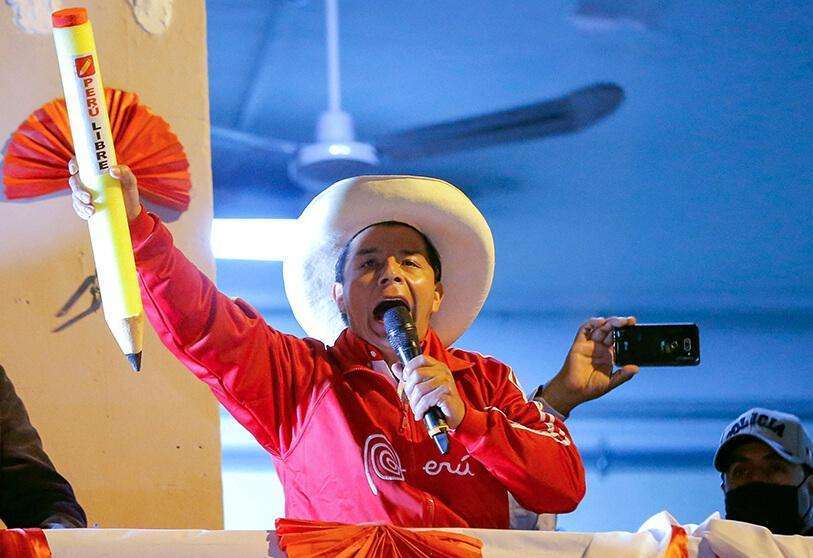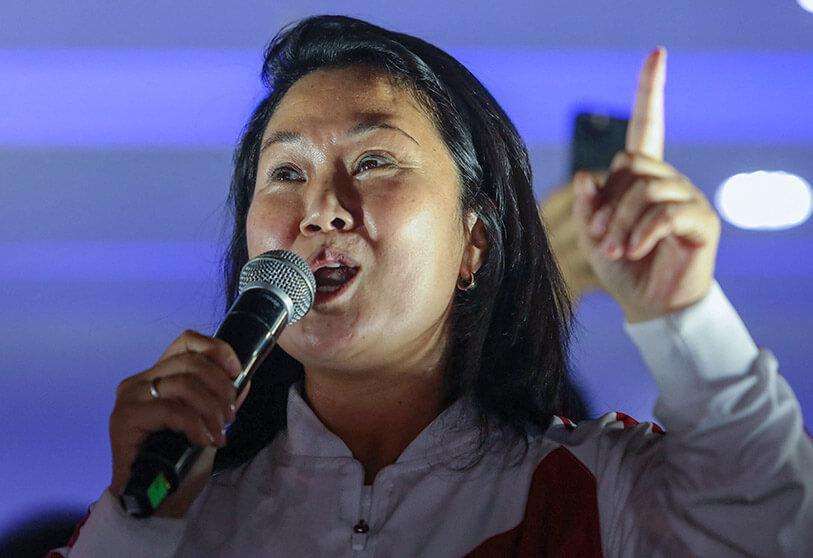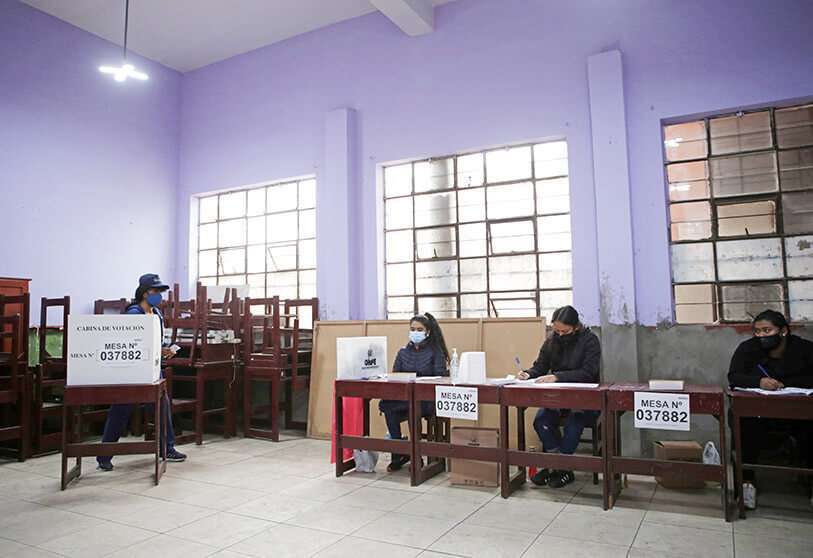Pedro Castillo, proclaimed president-elect of Peru in the face of Keiko Fujimori's acceptance

Peru now officially knows the name of its next president. After almost two months of waiting since the second round, the Andean country begins its difficult road to political stability after a campaign marked by polarisation, a count shrouded in controversy and a torrent of allegations of fraud dismissed by the authorities.
The National Electoral Jury (JNE) on Tuesday proclaimed Peru Libre's candidate, Pedro Castillo, as the country's president-elect for the next five years in a virtual ceremony. This ends the 43-day impasse since the leftist's victory at the polls by a margin of 44,263 votes over his rival, Keiko Fujimori.

Wearing his trademark hat, Castillo addressed the Peruvian people and hundreds of supporters who lined the streets outside Peru Libre's headquarters in Lima. "I have an open heart for each and every one of you. Here in this chest there is no rancour, there is no indifference. We are going to work together and reject anything that goes against democracy, we are going to reject any pretence of a model from another country, to guarantee legal and economic stability".
The teacher launched a message of unity: "At this moment I call for the broadest unity of the Peruvian people, to forge and open the door to the next bicentenary, sealing this bicentenary with all its differences, with all its problems and with everything we have lived through". The rural leader also had a few words for Keiko Fujimori: "I call on the leader of Fuerza Popular, Mrs. Fujimori, that we should not put up any more barriers to move this country forward. Welcome to this space to create a government of all Peruvians, of all bloods, without any distinction whatsoever".

Hours before Castillo's nomination, the JNE announced the unanimous rejection of the last five appeals presented by Fuerza Popular, Fujimori's political platform. The right-wing candidate announced beforehand that she would accept the body's decision despite having presented a total of 943 appeals for the annulment of alleged irregularities in the electoral process. All of them have been rejected, however, the right-wing leader has called her rival's victory in the elections "illegitimate".
The teacher and trade union leader obtained 50.12% of the votes in a tight run-off held on 6 June, after qualifying against all odds in the first round. Fujimori won 49.87% of the vote in the most tense election in living memory. The difference between the two was minimal and the count legal, according to the Andean authorities and international observers.
All of the appeals filed by Fuerza Nueva were declared "inadmissible and unfounded", which is why the party last week began a new route to challenge the elections. Fuerza Popular filed a habeas data against the National Office of Electoral Processes (ONPE), a legal action to gain access to the electoral rolls. Experts have pointed to this procedure as unconstitutional.

In line with the party's president, the spokesperson for Fuerza Popular in Congress has highlighted the differences between legality and legitimacy. "Legality implies respecting the norm, positive law, what is written. From the beginning we said that when the JNE proclaims anyone as the winner, we would respect this. However, legitimacy has to do with morality, the representativeness that a government has. For us, it gives neither representativeness nor legitimacy to Castillo's government", said Hernando Guerra García.
The daughter of dictator Alberto Fujimori will go on trial in the Odebrecht case, in which she is accused of alleged money laundering, criminal organisation and obstruction of justice. In the event of victory at the polls, the candidate would have obtained legal immunity in the exercise of the presidency. A remedy she will not be eligible for.
Pedro Castillo will replace interim President Francisco Sagasti on 28 June, when his mandate expires. In a normal context, the transition of power would have been completed within a month. However, the postponement of the appointment has meant that this time the change of power will take place in a record eight days. The professor's arrival in power will coincide, as the interim president has stressed, with Peru's bank holidays celebrating independence from the Spanish empire 200 years ago.

"I welcome the proclamation of Pedro Castillo as president-elect following the announcement of the results by the JNE. Let us look to the future of our country with optimism. Nine days away from the bicentenary, may this be the beginning of a new era of reconciliation, consensus and unity", Sagasti told his successor in office.
The figures who will make up Castillo's cabinet are not yet known. The president-elect revealed that he would announce the names "after the JNE's proclamation", but the only profile that has emerged is that of lawyer Dina Boluarte, who will become the first vice-president of the government. Other names that have been mentioned in recent hours are those of economist Pedro Francke and former congressman Hernando Cevallos.
Vladimir Cerrón, a doctor and founder of the Peru Libre party linked to the Bolivian and Venezuelan regimes, will not be able to join the Executive. He has been suspended from his post as governor of the Junín region for his involvement in several corruption cases, which has already separated him from his post as governor.

International congratulations were not long in coming after the appointment. "Finally, the National Jury of Elections proclaimed our brother Pedro Castillo as president of Peru. It is the triumph of dignity and unity of the humble people over neo-liberalism. Pedro will show how to govern for the most marginalised and sacrificed people," Evo Morales tweeted.
Nicolás Maduro dedicated another message to the president-elect of Peru: "A new political cycle is opening that we hope will be successful for this South American nation. The people of Venezuela embrace you brothers and sisters". Cuban President Miguel Díaz-Canel and Foreign Minister Bruno Rodríguez sent their congratulations to Castillo.
Peru begins a complex political transition in the midst of a deep division within Andean society and with a president, Pedro Castillo, who will have to rely on the entire political spectrum to implement each and every one of the reforms. The scenario in the coming months promises to shift the tectonic plates on which the country is built.
Latin America Coordinator: José Antonio Sierra








